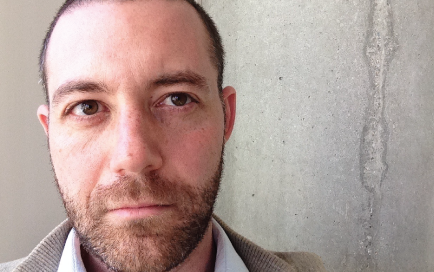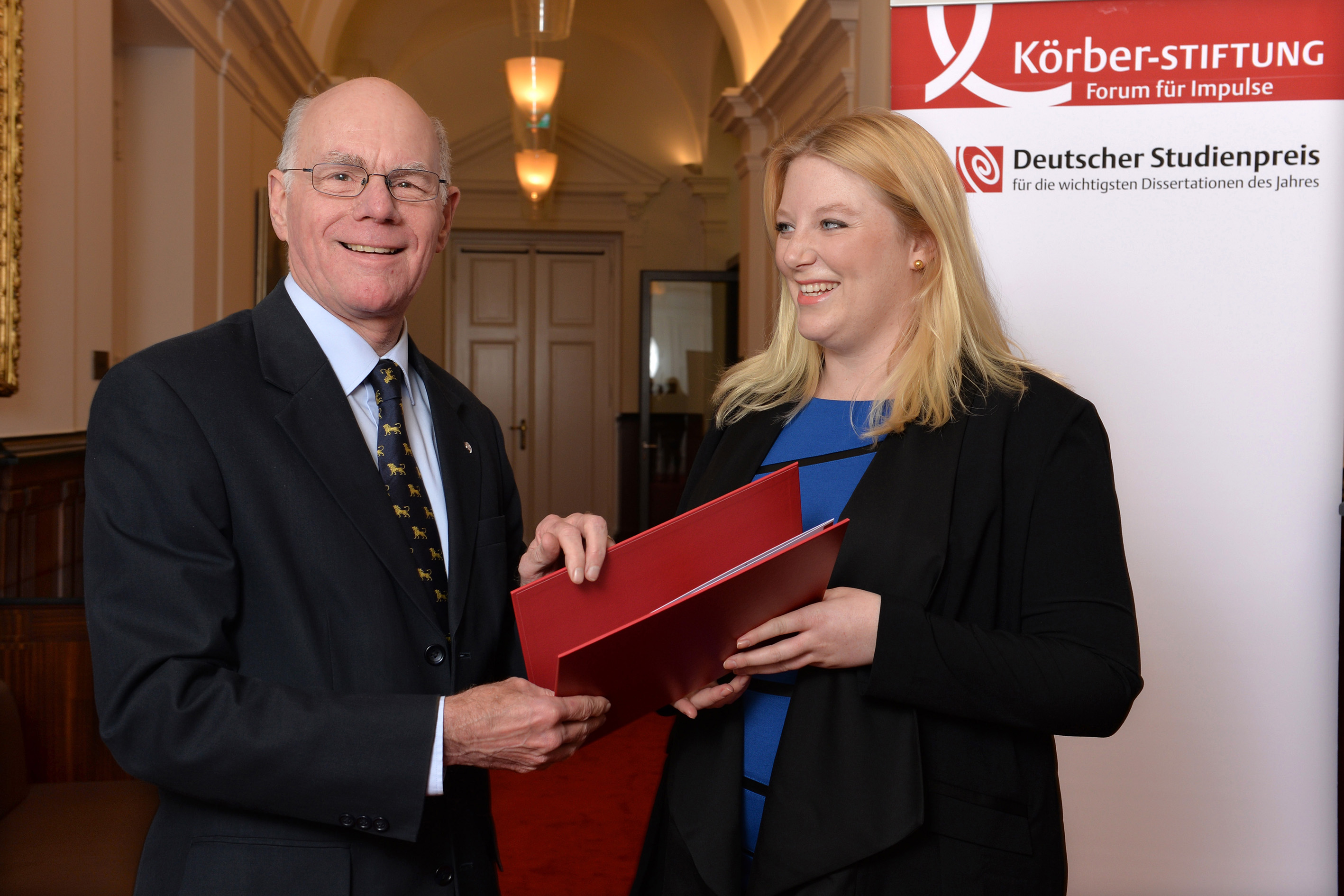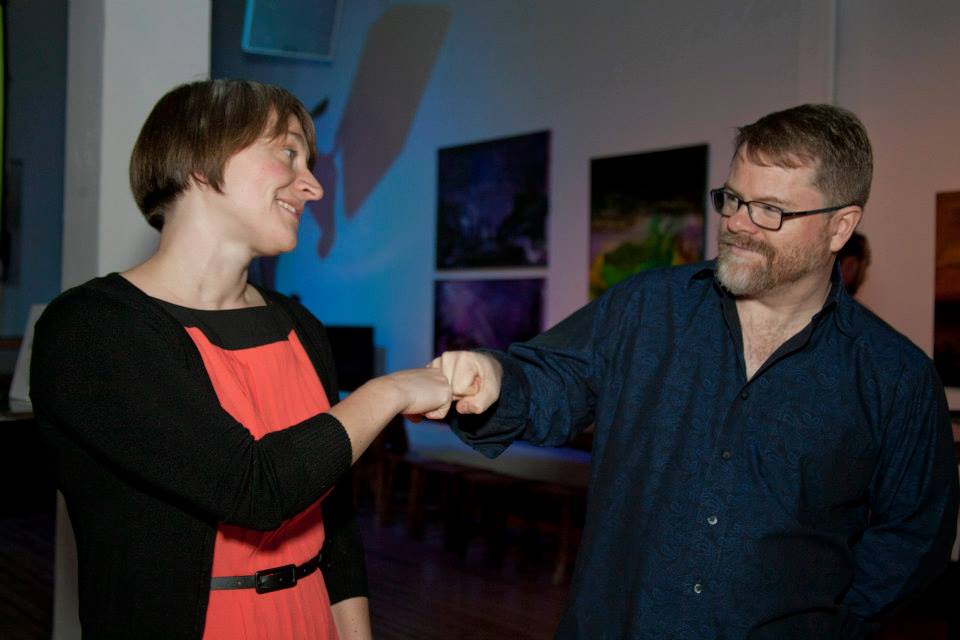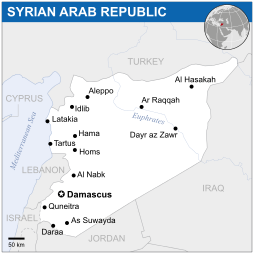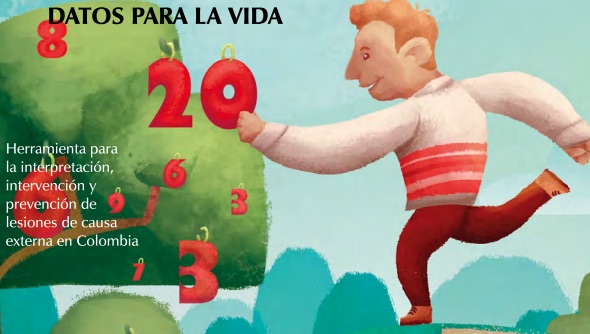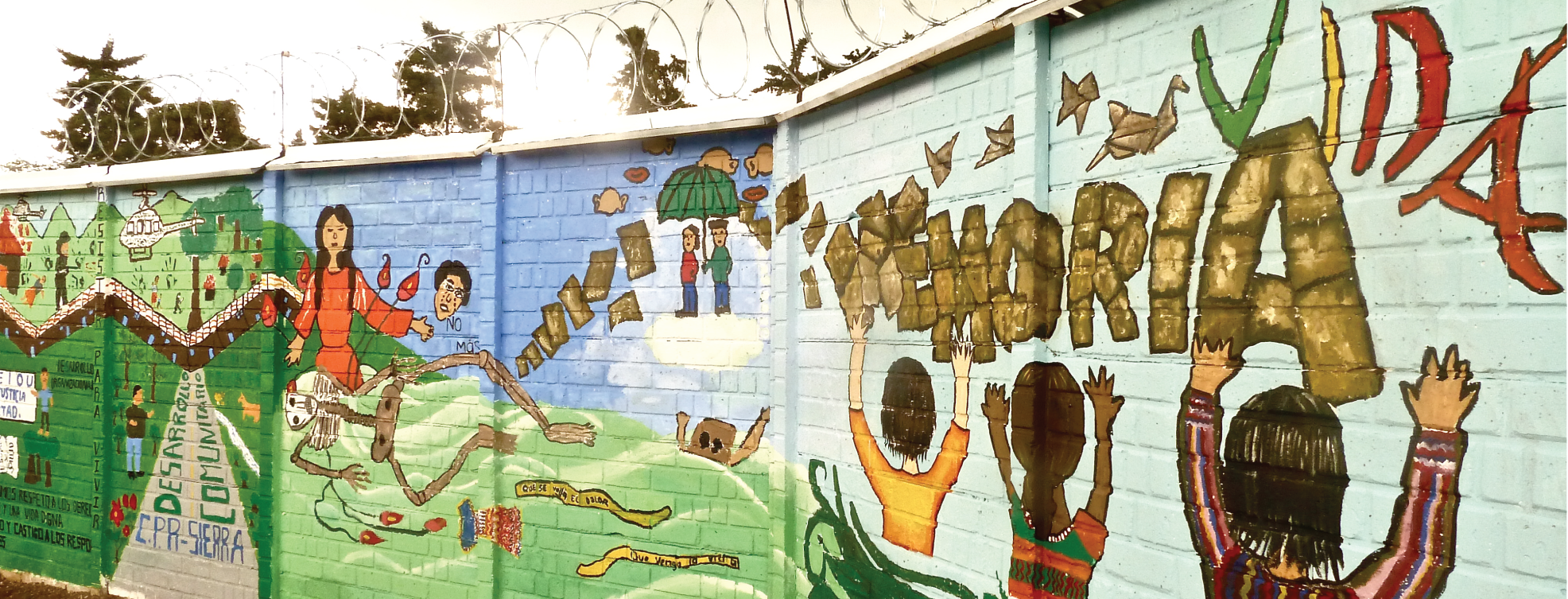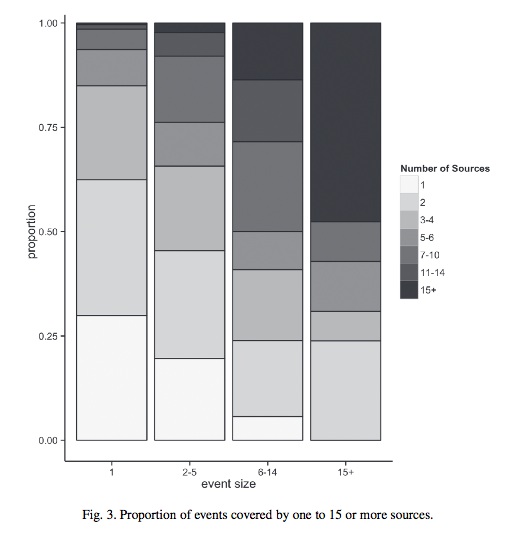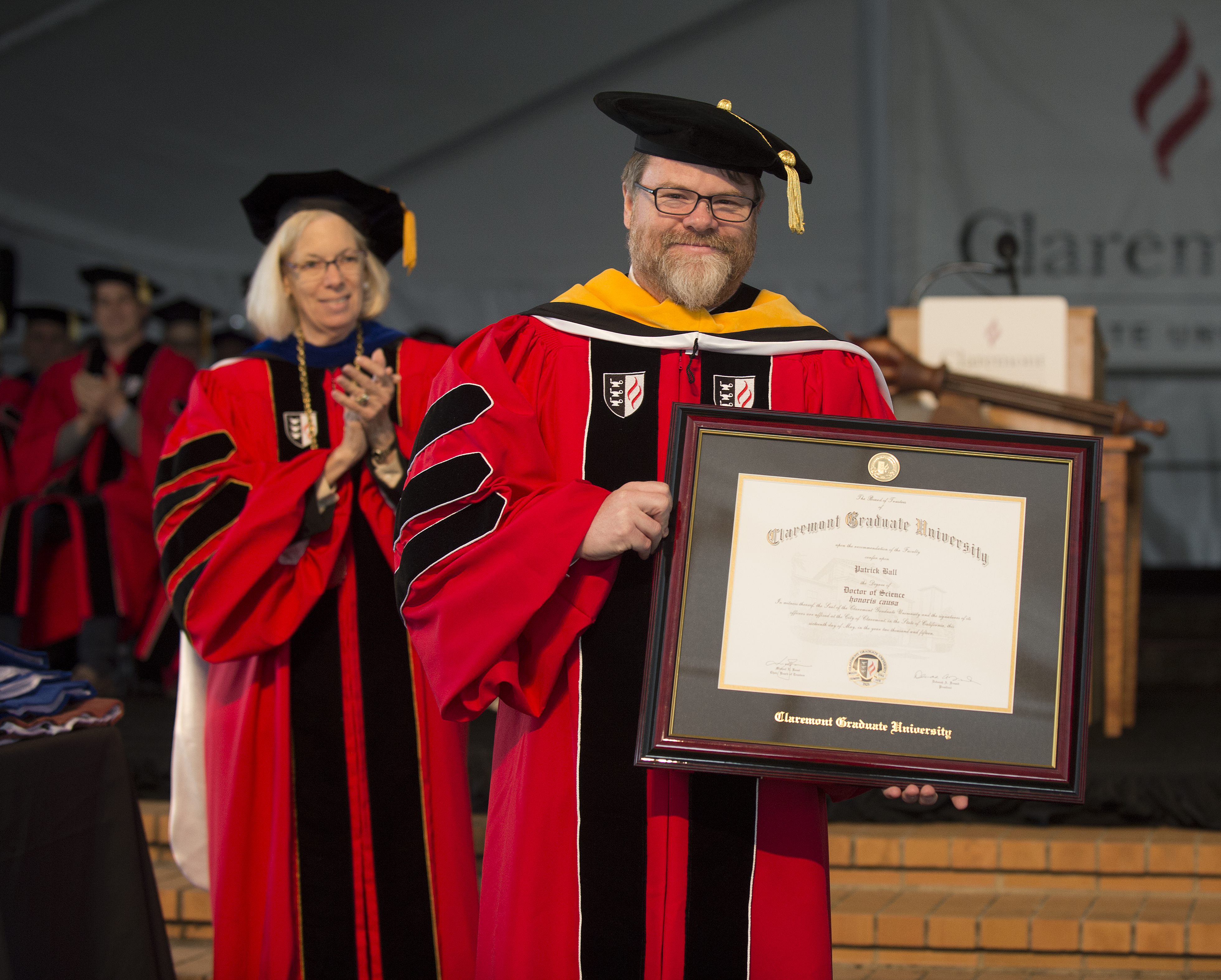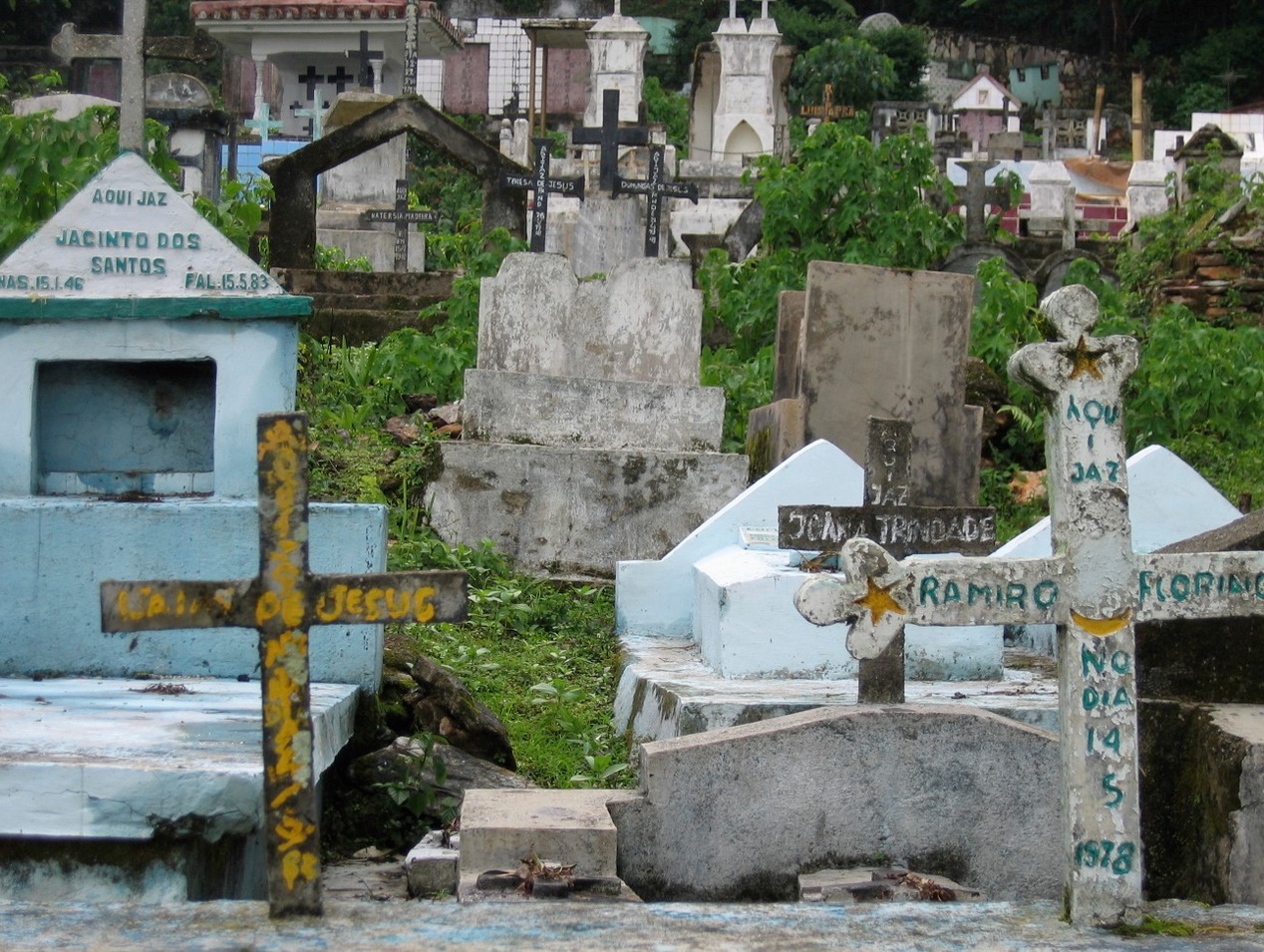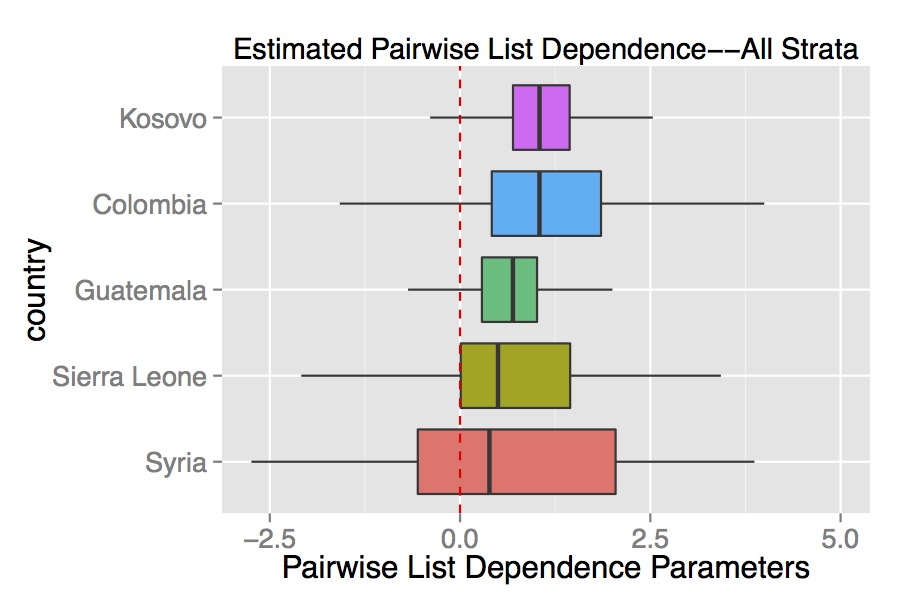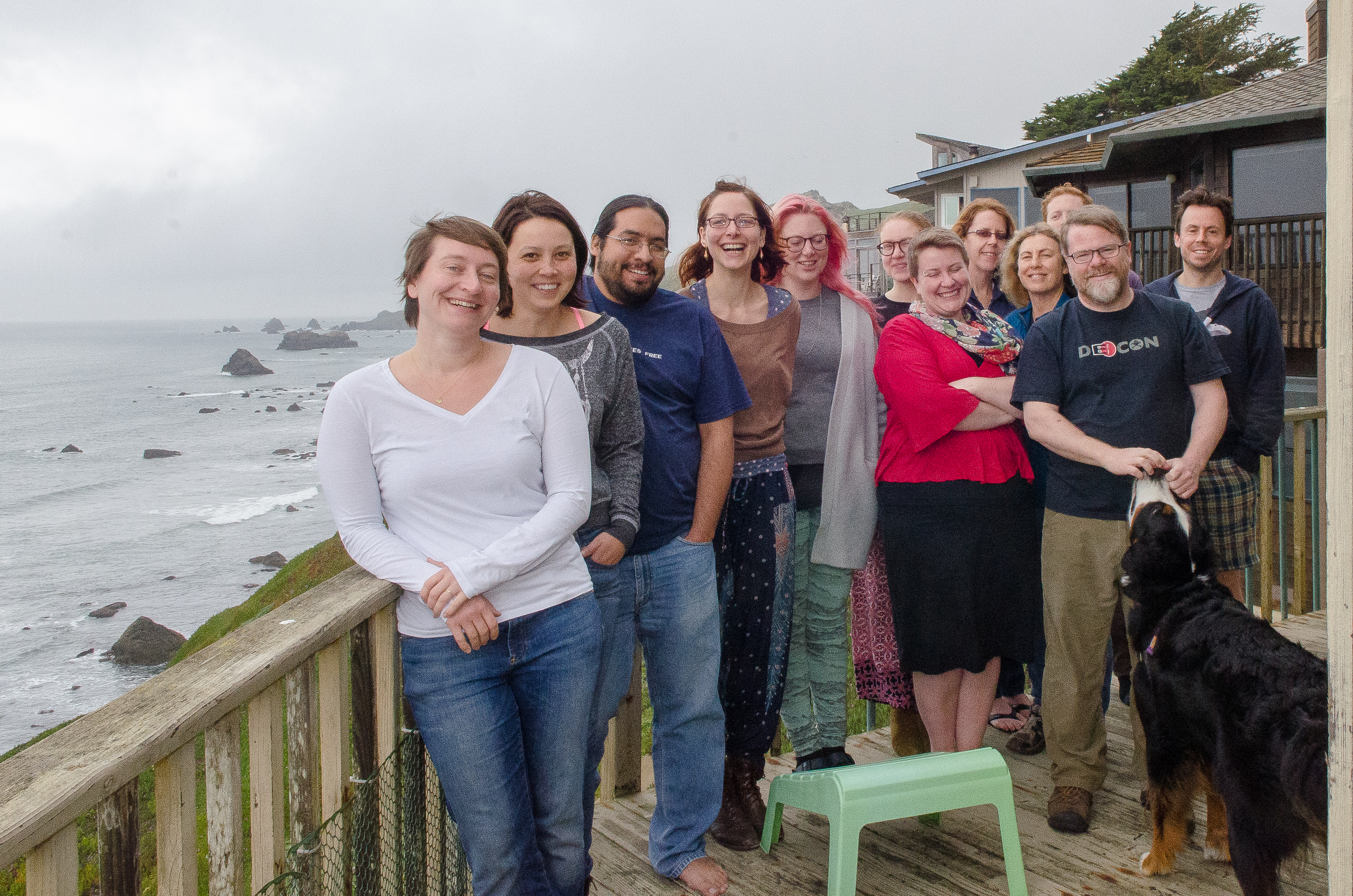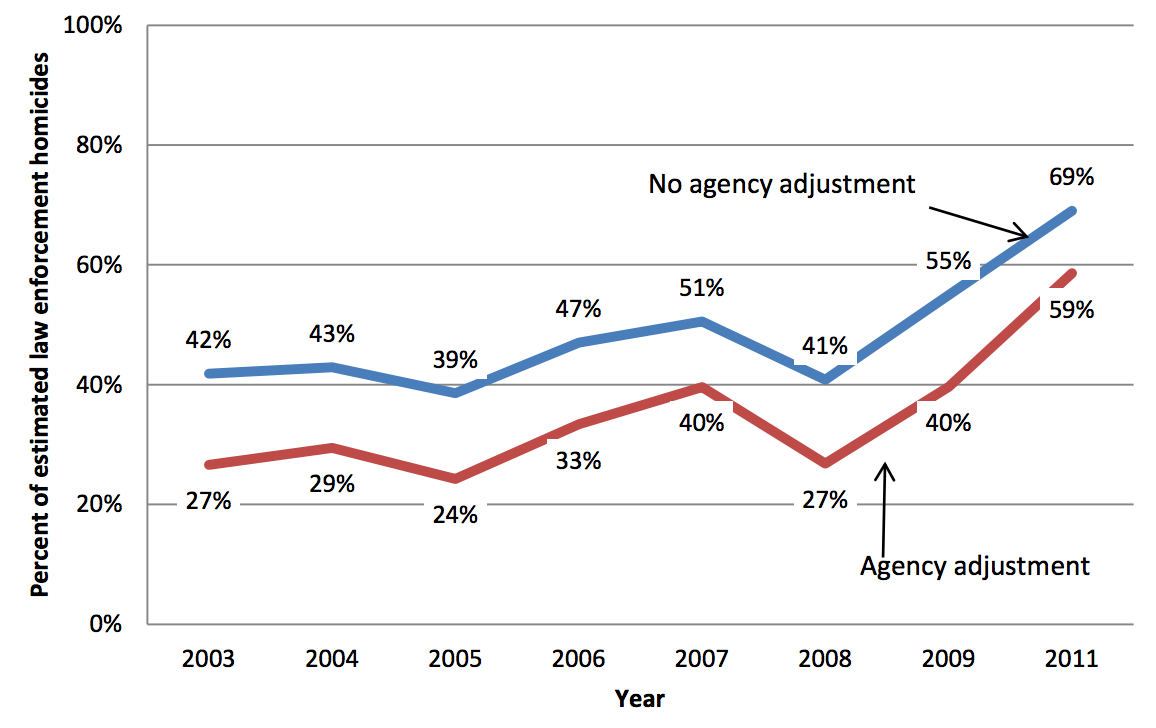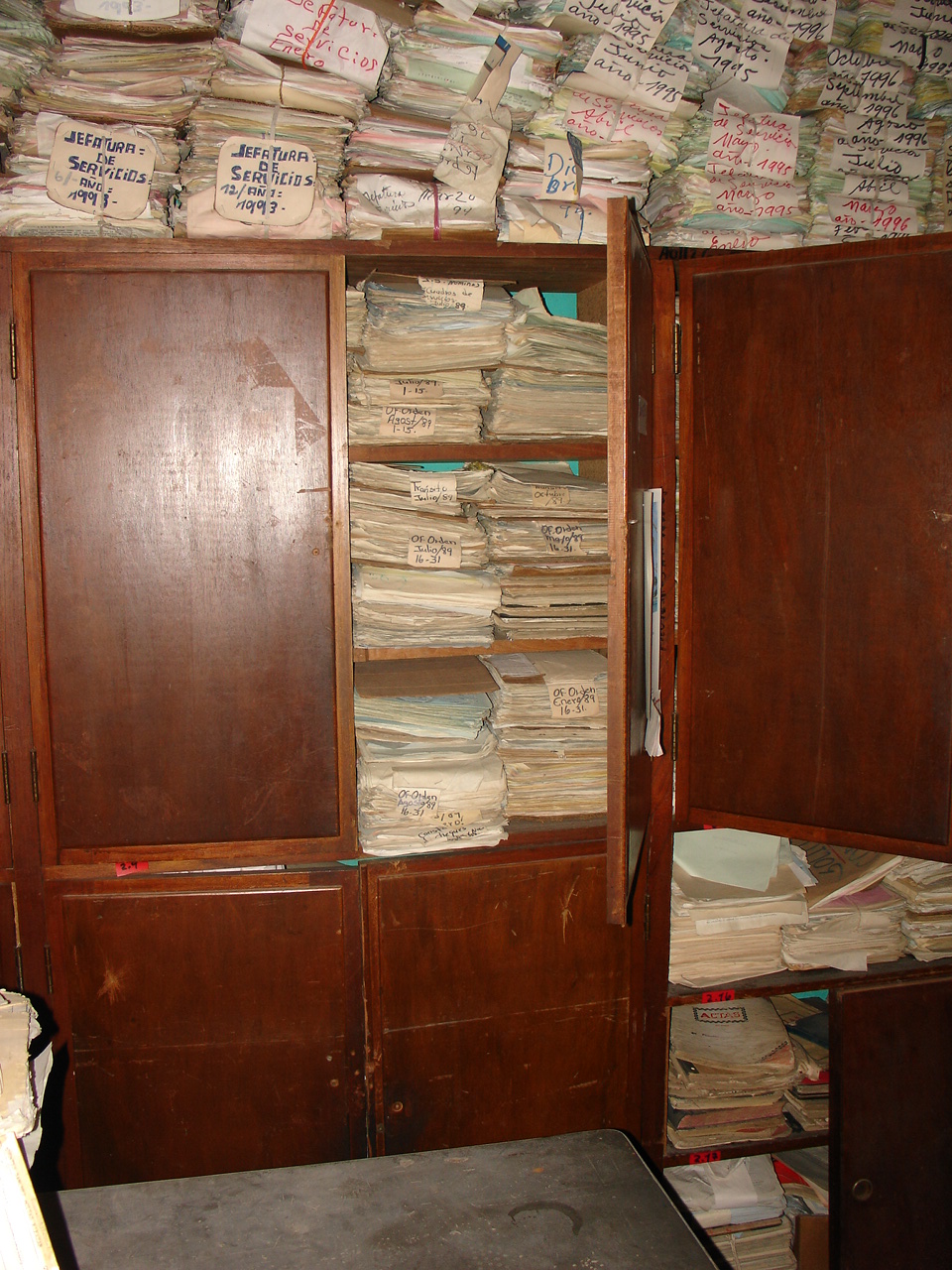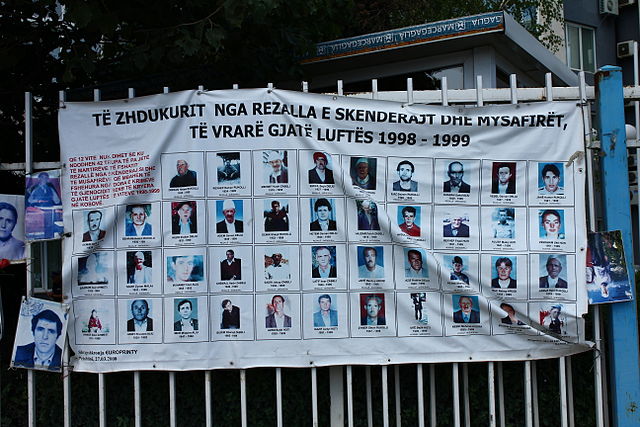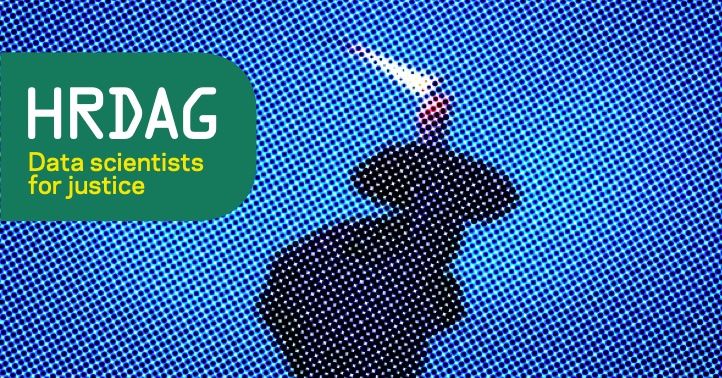Welcoming a New Board Member
As we get ready to begin our fourth year as an independent nonprofit, we are, as always, indebted to our Advisory Board and to our funders for their support and vision. We’re finishing up a busy year that took us to Dakar (for the trial of former Chadian dictator Hissène Habré), Pristina (for the release of the Kosovo Memory Book), Colombia (for work on a book about the Guatemalan Police Archives), and kept us busy here at home working on police violence statistics. But one of our biggest victories has been to score a new, talented, wise Advisory Board member—Michael ...
An Award for Anita Gohdes
On November 26, HRDAG colleague Anita Gohdes was awarded the German Dissertation Prize for the Social Sciences. The patron of the prize is the President of the German Parliament, Norbert Lammert, who presented Anita with the award.
Anita’s dissertation, “Repression 2.0: The Internet in the War Arsenal of Modern Dictators,” investigates the role played by social media networks in modern dictatorships, such as President Assad’s regime in Syria. On one hand, Anita argues, social media can help opposition groups to organize more effectively, but on the other ...
Changes at HRDAG
A special announcement from the HRDAG Advisory Board:
Beginning officially on December 1, HRDAG is changing leadership. After nearly three years as Executive Director, Patrick Ball will become the new Director of Research. Megan Price will be the new Executive Director.
Patrick has spent more than 25 years working at the intersection of human rights and statistical science. Over that time, he has finely honed statistical methodology for quantifying mass killings. Now he is excited about the chance to go deeper into research for HRDAG and develop additional approach...
Rapid response to: Civilian deaths from weapons used in the Syrian conflict
On November 4, 2015, the BMJ published our "Rapid Response" to Civilian deaths from weapons used in the Syrian conflict (BMJ 2015;351:h4736). The response was co-authored by Megan Price, Anita Gohdes, Jay Aronson (Carnegie Mellon University, Center for Human Rights Science), and Christopher McNaboe (Carter Center, Syria Conflict Mapping Project).
We have three concerns about this article. First, the article apportions responsibility for casualties to particular perpetrator organizations based on a single snapshot of territorial control that ignores the numerous (and ...
HRDAG Testifies in Hissène Habré Trial
Last week HRDAG’s executive director, Patrick Ball, served as an expert witness for the prosecution in the trial of Hissène Habré, the ruler of Chad from 1982 to 1990. The trial is taking place in Dakar, Senegal, where the 73-year-old Habré has been living since 1990 when he fled Chad. He has already been sentenced to death in absentia in Chad.
Habré is being charged with war crimes, crimes against humanity, and torture that took place during his eight-year reign. The trial is happening at the Extraordinary African Chambers, which was inaugurated by Senegal ...
Beka Steorts Named MIT Under-35 Innovator
We’ve known for years that Beka Steorts is on the cutting-edge of statistical science, and now The MIT Technology Review has realized the same. Last week she was named one of 35 Innovators Under 35, in the category of humanitarian.
We first became familiar with Beka's work in 2013 when she was a visiting professor at Carnegie Mellon and was introduced to us by Prof. Steve Fienberg. Since then, we’ve felt very fortunate to collaborate with her on projects such as the UN enumeration of casualties in the Syrian conflict, and we look forward to many more years of work ...
Analysis of Homicide Patterns in Colombia
Last week Forensis, the Colombian National Institute of Forensic Medicine’s flagship publication, published the first of our analyses of homicide patterns in Colombia. Authored by HRDAG executive director Patrick Ball and UN colleague Michael Reed Hurtado, “Cuentas y mediciones de la criminalidad y de la violencia” (pages 529-545) explores, as the title suggests, the quality of “truth” contained within crime registries. Citing the problem of partial data, missing data, and inherent design bias, Patrick and Michael write that no register, official or unofficial, ...
Ten Years and Counting in Guatemala
We have accomplished so much in the last 10 years at the Historical Archive of the National Police. And yet, despite the efforts, dedication, and commitment of each person who since 2006 has worked in the AHPN, we still can not say “mission accomplished.”
In 10 years the environment at the Archive has changed so much and become so full of life. Where the building once sheltered unknown stories, over time some of those stories have been revealed. But Guatemala has a long way to go in letting the world get to know more deeply about the secrets within the documents ...
Celebrating Ten Years of Data from the AHPN
Ten years ago, in July 2005, human rights officers stumbled upon a nondescript warehouse in a commercial zone of Guatemala City and changed history. They had discovered an archive–its existence kept secret–belonging to the Guatemalan National Police, whose officers committed human rights atrocities on behalf of the government during the civil war.
Inside the building was the bureaucratic detritus typical of a large government agency: 80 million pages detailing shifts worked, tasks assigned, assignments fulfilled, workers’ whereabouts, and who was supervising ...
Update of Iraq and Syria Data in New Paper
This week The Statistical Journal of the IAOS published a new(ish) paper by Megan Price and Patrick Ball. The open-access paper, Selection bias and the statistical patterns of mortality in conflict, is a revisiting and updating of both the Iraq and Syria examples used in an earlier paper, Big Data, Selection Bias, and the Statistical Patterns of Mortality in Conflict, which was published last year inThe SAIS Review of International Affairs (JHU Press, 2014).
HRDAG believes that the concerns highlighted by these examples are important for a wide variety of audiences, ...
Patrick Ball Honored with Degree at Claremont Graduate University
We’re happy to announce that our executive director, Patrick Ball, has been presented an honorary degree from Claremont Graduate University in Claremont, California. University President Deborah Freund presented the degree to Patrick at the university’s 88th annual commencement ceremony on Saturday, May 16, 2015. The degree conferred was Doctor of Science honoris causa.
“We at CGU are thrilled that Patrick Ball accepted our Honorary Degree invitation and joined us for commencement,” said Thomas Horan, CGU Professor and Director, Center for Information ...
When Data Doesn’t Tell the Whole Story
This blog is a part of International Justice Monitor’s technology for truth series, which focuses on the use of technology for evidence and features views from key proponents in the field.
As highlighted by other posts in this series, emerging technology is increasing the amount and type of information available, in some contexts, to criminal and other investigations. Much of what is produced by these emerging technologies (Facebook posts, tweets, YouTube videos, text messages) falls in the category we refer to as “found” data. By “found” data we mean data ...
Focus on Good Science, not Scientists
We recently learned about an article by Dr Nafeez Ahmed that criticizes the methods and conclusions of the Iraq Body Count (IBC) and the work of Professor Michael Spagat. Dr Ahmed cites our work extensively in support of his arguments, so we think it’s useful for us to reply.
We welcome Dr Ahmed’s summary of various points of scientific debate about mortality due to violence, specifically in Iraq and Colombia. We think these are very important questions for the analysis of data about violent conflict, and indeed, about data analysis more generally. We appreciate his ...
HRDAG Offers New R Package – dga
Much of the work we do at HRDAG involves estimating the number of undocumented deaths using a statistical technique called multiple systems estimation (MSE, described in more detail here). One of our goals is to make this class of methods more broadly available to human rights researchers. In particular, we are finding that Bayesian approaches are extremely valuable for MSE. Accordingly, we are pleased to offer a new R package called dga (“decomposable graphs approach”) that performs Bayesian model averaging for MSE.
The main function in this package implements a ...
How many police homicides in the US? A reconsideration
(This post is co-authored by Patrick Ball and Kristian Lum.)
In early March, the Bureau of Justice Statistics published a report that estimated that in the period 2003-2009 and 2011, there were approximately 7427 homicides committed by police in the US. We responded that the method the analysts used, capture-recapture with two databases, is vulnerable to underestimation if the databases exhibit positive dependence. We conduct a thorough sensitivity analysis on the original independence model as applied to the police homicides databases. We used information from several ...
HRDAG Retreat 2015
I look at the beach and then at the table surrounded by nerds, deep in thought and conversation about Dirichlet priors, matching algorithms, and armed conflicts. This peculiar (in the best way) environment catalyzes a moment of reflection: how did I get here?
Four years ago, as a second-year statistics PhD student, I watched "Guatemala: The Secret Files" on PBS Frontline World. I listened to stories of family members who disappeared without answers or justice. Then the story shifted to the work being done by archivists and data experts at Guatemala's Historic Archive ...
BJS Report on Arrest-Related Deaths: True Number Likely Much Greater
(This post is co-authored by Patrick Ball and Kristian Lum.)
Today the Bureau of Justice Statistics (BJS) released a report on their effort to document “all deaths that occur during the process of arrest in the United States.” The analysis estimates that the Arrest-Related Deaths (ARD) program covers only 34-49% of these deaths. A parallel program by the FBI (the Supplementary Homicide Reports, SHR) is estimated to cover approximately the same proportion of deaths. Even taking into consideration both programs, 28% of all police homicides remain unreported.
In ...
The Great Lessons in Research at the Archive
Doing an investigation on the contents of the Archive brought with it three major lessons. The first big lesson was the constant movement (nothing was static), The second great lesson was that everything evolved (the changes were a constant). The third major lesson was to discover how two institutions can work together while geographically far apart.
The constant movement
As there were other processes being carried out at the Archive, everything was in constant movement. In other words, one day the documents were in X location and tomorrow they may be in location Y ...
Evaluation of the Kosovo Memory Book
At the end of 2014 we completed the evaluation of the Kosovo Memory Book database and are pleased to conclude that the database has succeeded in documenting all or nearly all the human losses during conflicts in Kosovo during the period from 1998 to 2000.
With a motto of "Let people remember people," the goal of the Kosovo Memory Book (KMB) is to document all people who were killed or disappeared in connection with the war in Kosovo. The project aimed to document all human losses during armed conflict in the territory of the Former Yugoslav Republic (FYR) between 1998 ...
Yezidi Activists Teach HRDAG about Human Rights – updated
UPDATE (21 Dec 2014): Juan Cole is reporting that the Kurdish militia (the peshmerga) have retaken Shingal (also known as Sinjar) mountain where many Yezidi people have been trapped since 3 August 2014. They are now moving to liberate other Yezidi towns south of the mountain. The Yezidi people trapped on the mountain are now free. There is no word yet on the thousands of Yezidi people enslaved by ISIS.
ORIGINAL (19 Nov 2014): Farhad (not his real name) got the call from ISIS on his personal cell phone just after lunch: we have your sister, and we will give her back if ...

